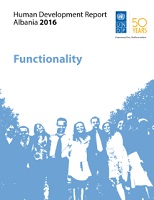
We kindly inform you that, as long as the subject affiliation of our 300.000+ articles is in progress, you might get unsufficient or no results on your third level or second level search. In this case, please broaden your search criteria.

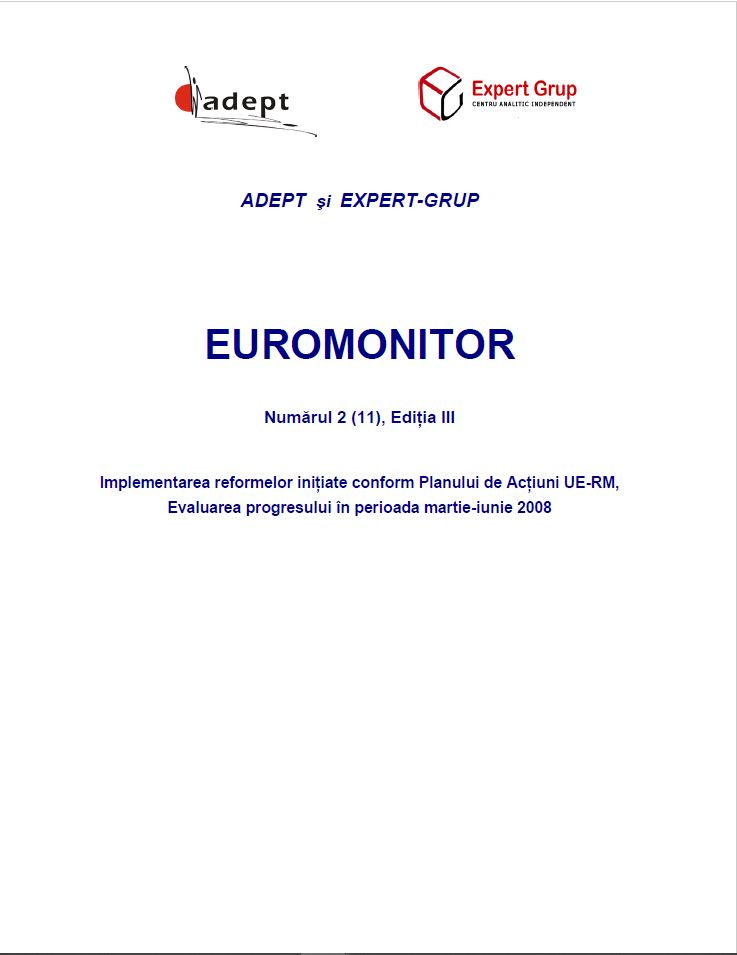
The reports in the "Euromonitor" series aim at independent and objective monitoring of the implementation process of the Republic of Moldova - European Union Action Plan. The actions adopted and implemented by both signatories of the Plan will be monitored quarterly. The action plan is a complex document, structured in 7 chapters, which provides for the implementation of about 300 actions, some defined more or less precisely, others very ambiguous. Unable to monitor such a complex document, the authors of "Euromonitor" focused on priority actions, identified in the Action Plan itself.
More...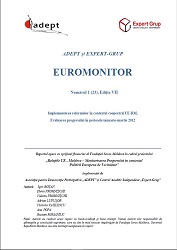
The reports in the "Euromonitor" series aim at independent and objective monitoring of the implementation process of the Republic of Moldova - European Union Action Plan. The actions adopted and implemented by both signatories of the Plan will be monitored quarterly. The action plan is a complex document, structured in 7 chapters, which provides for the implementation of about 300 actions, some defined more or less precisely, others very ambiguous. Unable to monitor such a complex document, the authors of "Euromonitor" focused on priority actions, identified in the Action Plan itself.
More...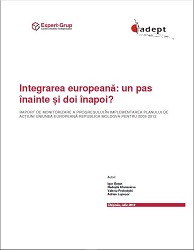
The purpose of the document is to develop an independent analysis of the policies and reforms implemented by the Chisinau authorities in order to bring them closer to the European Union, politically, economically and institutionally. In particular, the European Union - Republic of Moldova Action Plan (EUMAP) was monitored, which is the most important and exhaustive strategic planning document where all of Moldova's commitments in the European integration process are specified. Although the formal implementation period is 2005-2012, it has been automatically extended for an indefinite period. Moreover, the EUMAP remained current, given that the vast majority of the necessary priorities and actions specified in the plan are still relevant today.
More...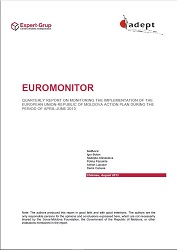
QUARTERLY REPORT FOR MONITORING THE PROGRESS IN IMPLEMENTING THE EU-MOLDOVA ACTION PLAN IN APRIL-JUNE 2013. // The quarterly report EUROMONITOR is based on 28 areas for which it shows the developments during the monitored period, assesses the impact of the action taken, and identifies major problems. The presentation of the initial situation (as of 2005) and of the current situation (as of 2012) is made on the basis of the conclusions made for the evaluation report covering the progress achieved in the period of 2005-2012, and it is focused on areas included into the report. The quarterly progress for 2013 has also been assessed along the areas included into the report.
More...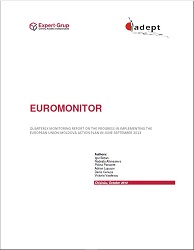
The quarterly monitoring Report on European Union – Moldova Action Plan (EURMAP) implementation during July-September 2013 is developed within the joint project "EU -Moldova - monitoring the progress in the Eastern Partnership 2013 " funded by the Soros Foundation –Moldova. // The quarterly report EUROMONITOR is based on 28 areas for which it shows the developments during the monitored period, assesses the impact of the action taken, and identifies major problems.
More...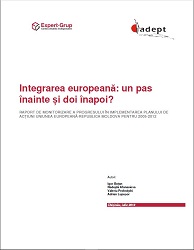
The reports in the "Euromonitor" series aim at independent and objective monitoring of the implementation process of the Republic of Moldova - European Union Action Plan. The actions adopted and implemented by both signatories of the Plan will be monitored quarterly. The action plan is a complex document, structured in 7 chapters, which provides for the implementation of about 300 actions, some defined more or less precisely, others very ambiguous. Unable to monitor such a complex document, the authors of "Euromonitor" focused on priority actions, identified in the Action Plan itself.
More...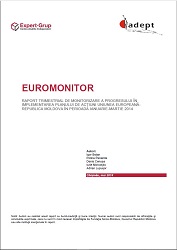
The reports in the "Euromonitor" series aim at independent and objective monitoring of the implementation process of the Republic of Moldova - European Union Action Plan. The actions adopted and implemented by both signatories of the Plan will be monitored quarterly. The action plan is a complex document, structured in 7 chapters, which provides for the implementation of about 300 actions, some defined more or less precisely, others very ambiguous. Unable to monitor such a complex document, the authors of "Euromonitor" focused on priority actions, identified in the Action Plan itself.
More...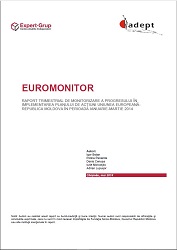
QUARTERLY MONITORING REPORT ON THE PROGRESS IN IMPLEMENTING THE EUROPEAN UNION–MOLDOVA ACTION PLAN IN JULY - SEPTEMBER 2014 // The reports in the "Euromonitor" series aim at independent and objective monitoring of the implementation process of the Republic of Moldova - European Union Action Plan. The actions adopted and implemented by both signatories of the Plan will be monitored quarterly. The action plan is a complex document, structured in 7 chapters, which provides for the implementation of about 300 actions, some defined more or less precisely, others very ambiguous. Unable to monitor such a complex document, the authors of "Euromonitor" focused on priority actions, identified in the Action Plan itself.
More...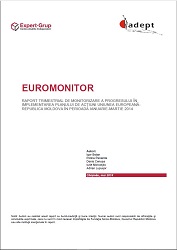
QUARTERLY REPORT ON MONITORING PROGRESS IN IMPLEMENTING THE EUROPEAN UNION-REPUBLIC OF MOLDOVA ACTION PLAN OCTOBER-DECEMBER 2014 // The reports in the "Euromonitor" series aim at independent and objective monitoring of the implementation process of the Republic of Moldova - European Union Action Plan. The actions adopted and implemented by both signatories of the Plan will be monitored quarterly. The action plan is a complex document, structured in 7 chapters, which provides for the implementation of about 300 actions, some defined more or less precisely, others very ambiguous. Unable to monitor such a complex document, the authors of "Euromonitor" focused on priority actions, identified in the Action Plan itself.
More...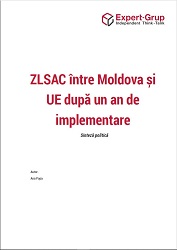
September 2015 marked the end of one year since the entry into force of the Deep and Comprehensive Free Trade Area (DCFTA) between the Republic of Moldova and the European Union (EU). This is certainly one of the greatest achievements in EU-Moldova relations. From the initial stages of the Association Agreement (AA) and DCFTA negotiation process, they have generated high expectations among supporters of European integration and fueled speculation by Eurosceptics. One year after the implementation of DCFTA begins, it is the right time to see to what extent these expectations have been met. // The first year after the implementation of DCFTA was marked by serious economic and political problems, both in the EU and in the Republic of Moldova, which affected the demand on the internal market and the confidence of the business environment, generating consequences for foreign trade activity and investments of both parties. Moreover, they were accentuated by the repercussions from Russia - an important trading partner for the Republic of Moldova and the EU (especially for some states). All these factors certainly distort the results of the first year of DCFTA implementation.
More...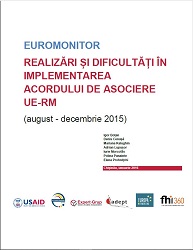
The reports in the "Euromonitor" series aim at independent and objective monitoring of the implementation process of the Republic of Moldova - European Union Action Plan. The actions adopted and implemented by both signatories of the Plan will be monitored quarterly. The action plan is a complex document, structured in 7 chapters, which provides for the implementation of about 300 actions, some defined more or less precisely, others very ambiguous. Unable to monitor such a complex document, the authors of "Euromonitor" focused on priority actions, identified in the Action Plan itself.
More...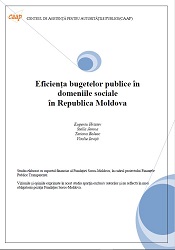
The path to a market economy and the withdrawal of the state from many areas of economic activity has given rise in the transition period to several adverse social phenomena such as unemployment, poverty and other elements that have, in turn, negative effects on the educational, cultural and in general affects the quality of life of the population. Not to mention the declining capacity of the state to support vulnerable groups such as pensioners and people with disabilities at a decent level. // Even if the transition to a market economy meant reducing the role of the state in the economy, however, the deficiencies of market mechanisms and their inability to self-regulate or to meet the full spectrum of societal requirements, involve finalizing those social policies. And now social policies are supported by support programs in special cases such as child raising benefits, support for families with many children, the disabled, in case of loss of care, in case of illness or temporary incapacity for work and others. // PUBLISHED BY CENTRUL DE ASISTENŢĂ PENTRU AUTORITĂŢILE PUBLICE (CAAP - Chişinau)
More...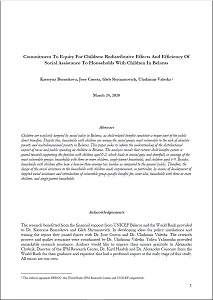
Children are explicitly targeted by social policy in Belarus, as child-related benefits constitute a major part of the public direct transfers. Despite this, households with children are among the social groups most vulnerable to the risk of absolute poverty and multidimensional poverty in Belarus. This paper seeks to inform the understanding of the distributional impact of taxes and public spending on children in Belarus. The analysis reveals that current child benefits system is geared towards supporting the families with children aged 0-2, which leads to crucial gaps and shortfalls in coverage of the most vulnerable groups: households with three or more children, single-parent households, and children aged 6-9. Besides, households with children often bear a heavier-than-average tax burden as compared to the general public. Therefore, the design of the social assistance to the households with children needs improvement, in particular, by means of development of targeted social assistance and introduction of vulnerable group-specific benefits for, inter alia, households with three or more children, and single-parent households.
More...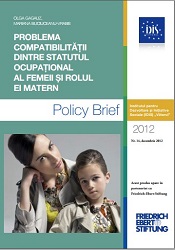
As for the Republic of Moldova, it is seen that high career requirements are listed on a secondary position to the financial problems and shortcomings. According to the research findings, the justification of the own attitude towards professional activity relates primarily to the economic aspect of the family being a source of income for 74.8% of respondents. The pro¬fessional activity becomes a means of self-ful¬fillment and autonomy for 41% and for about 38% - an opportunity to obtain financial inde¬pendence. With the increase in the number of children, through the involvement in the labor field women claim, primarily, the need for a significant additional income to support the family. Rationalizing on the motivation justifying the involvement into the labor market of the woman who has a child of preschool age, about 2/3 of respondents equally emphasize the “financial and material shortcomings”. Much lower, but significant values are assigned to: desire to have the “own” money (about 39%), satisfaction and interest in work (25.7%), and finally, the need to accumulate work experience (23.3%). Without deviating from the upper position assigned to economic problems, with the increase in the level of education of respondents, rises, as well, the share of motivation towards the interest in the job and the desire of financial independence.
More...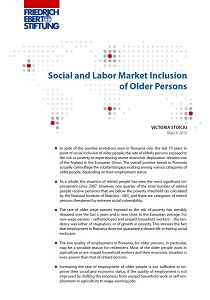
According to the last Romanin census in 2011, the persons aged 65 and over represent 16.1% of total population. A Presidential Committee report es¬timates that the five million persons aged 65 and over will represent, at the middle of the century, 30% of the country’s population, i.e. third times more than in the early 1990s (Presidential Admin-istration, 2009). // Aging is usually associated with a decline in activity or with entering inactivity, with higher depen-dency on healthcare and social services and often with a more precarious economic situation. This has economic implications, as well as an impact on the organization and functioning of society. // This paper is intended as a brief overview of the situation of older persons in Romania. The follow¬ing analysis will focus on the economic and social inclusion status of older persons, as well as on the access of the elderly to the labor market.
More...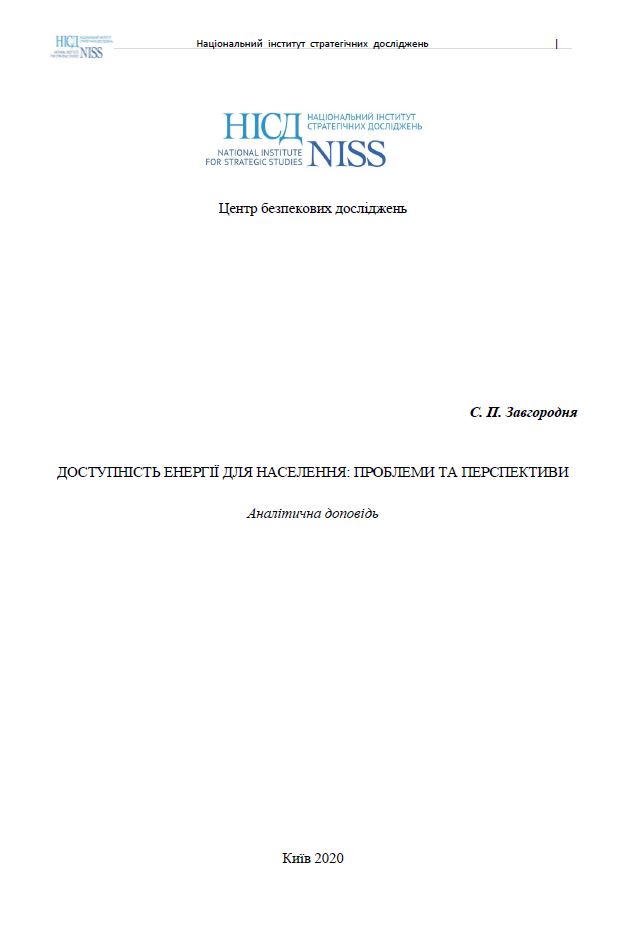
The problems of ensuring the availability of energy for the population, which is one of the most important aspects of achieving the Goal "Ensuring access to affordable, reliable, sustainable and modern energy sources for all" among the Sustainable Development Goals of Ukraine for the period up to 2030. Given the European integration vector of development of our country, the current trends in ensuring the availability of energy for the population in the EU member states and Ukraine are analyzed. The institutional features of identifying and combating energy poverty in EU member states, key issues of implementation of EU legislation and implementation of foreign experience in Ukraine to ensure access to energy for the population are identified. // Designed for experts, scientists, specialists in the fields of public administration, economics, social development and national security, civil servants, representatives of public organizations and anyone interested in ensuring access to energy for the population and combating energy poverty.
More...
O podacima o posledicama epidemije po javno zdravlje sam pisao tri puta. Sredinom maja prošle godine i dva puta u februaru ove godine. Podaci su neinformativni. Jer je broj obolelih veliki, dok je u odnosu na zaraženost, da tako kažem, broj umrlih mali. Pogotovo je mali u odnosu na stopu umrlih koja je prošle godina značajno povećana, a tako je i u januaru ove godine. Broj umrlih od virusa je oko jedne četvrtine povećanog broja umrlih u prošloj godini (u odnosu na petogodišnji prosek), a oko polovine u prvom mesecu 2021.
More...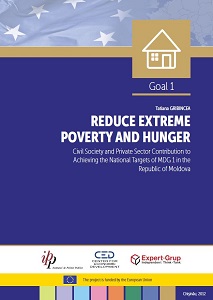
This report examines the role of civil society and private sector in the Republic of Moldova in achieving the Millennium Development Goal 1 “Eradicate extreme poverty and hunger” (MDG 1). In the study participated in the civil society and the private sector and relevant government institutions and relevant international organizations.
More...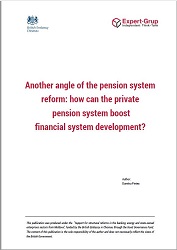
The financial data for 20161 year prove that financial intermediation is impaired by some structural deficiencies, although banks accumulate excess liquidity, these still remain relatively expensive, with low maturity and finally unattractive to the real economy. In these conditions, to recover and develop, the financial system needs modern mechanisms and tools, in particular long-term financial resources that could support long-term investment projects. Moreover, amid relatively short maturity of bank deposits, low interest of companies in capital market and limited access to foreign capital markets, private pension system is still the most viable solution for long-term development of financial resources. // Thus, we find that although the pension system reform has recently intensified, it does not provide any incentives for development of the private pension system, and this study seeks to bring back to the public attention the importance of the private pension system, the gaps hindering its development, and solutions to strengthen social equity and provide a decent life in the post-active period. Also, some long-term liquidity is needed, resources collected through private pensions could also be a starting point for development and modernization of the domestic financial market.
More...